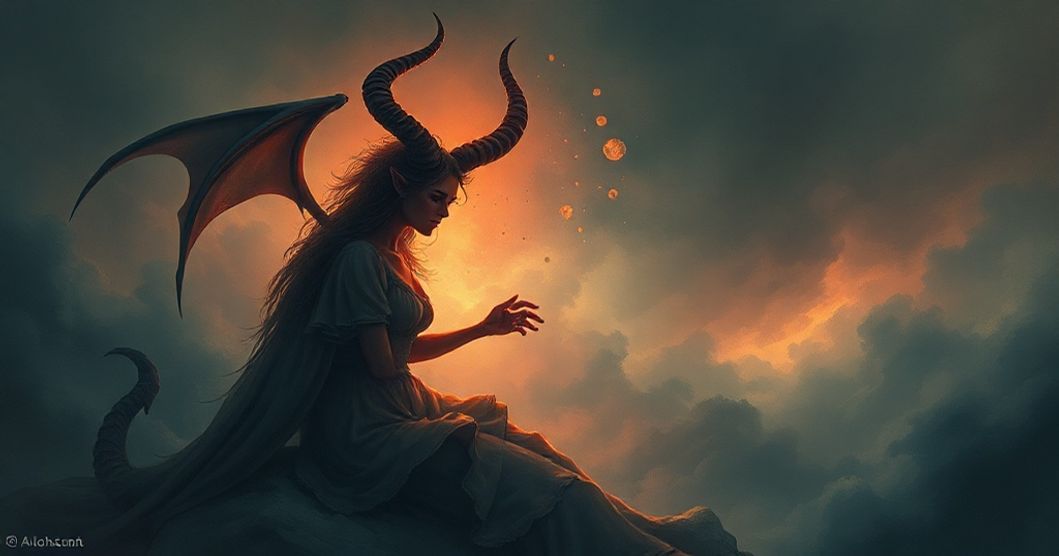Part 1: Dream Presentation
Dreams often serve as emotional mirrors, reflecting our deepest unresolved feelings through surreal imagery. This particular dream, marked by its intense imagery and personal stakes, offers a window into the dreamer’s complex relationship with grief and transformation.
The dream begins in a living room bathed in the quiet beauty of snowfall—a peaceful backdrop that contrasts sharply with the emotional turbulence to follow. The sudden appearance of the mother, smiling and wearing her favorite pink t-shirt, triggers an immediate emotional response: tears, longing, and the instinct to reconnect. This initial warmth is quickly disrupted by an uncanny shift in her demeanor, her smile curdling into a 'creepy evil smile' that signals a violation of the dreamer’s expectations. The dialogue—'I’m done being nice... now I’m a demon'—reveals a darker undercurrent, suggesting the mother figure has transformed into a symbol of the dreamer’s internal conflict rather than a literal revenant.
The dream’s narrative takes a surreal turn with teleportation and combat: the living room warps into a cramped space, and the mother attacks. Yet the dreamer awakens with 'heightened senses' and 'underdeveloped abilities,' evoking a sense of empowerment. The dream ends with the dreamer waking drenched in sweat, haunted by the lingering unease—a powerful symbol of the emotional weight carried into waking life.
Want a More Personalized Interpretation?
Get your own AI-powered dream analysis tailored specifically to your dream
🔮Try Dream Analysis FreePart 2: Clinical Analysis
Symbolic Landscape: The Demon Mother as Shadow Archetype
The mother’s transformation into a demon is one of the dream’s most striking elements, embodying the Jungian concept of the shadow—the repressed, darker aspects of the psyche. In this case, the shadow materializes as a demonic version of a beloved figure, reflecting the dreamer’s struggle to reconcile love for their mother with the pain of her loss. The 'demon' label likely functions as a metaphor for the dreamer’s anger, betrayal, or guilt: the mother’s declaration ('I got tired of being screwed over by always being nice') suggests the dreamer may project feelings of being 'screwed over' by life’s hardships onto the mother’s memory.
The pink t-shirt, a familiar, comforting object, becomes corrupted by the demonic transformation, symbolizing how even cherished memories can feel threatening when grief and trauma resurface. The snowfall, initially peaceful, foreshadows the emotional 'storm' to come, while the living room—once a safe space—becomes a battlefield, mirroring the dreamer’s internal conflict.
Psychological Currents: Grief, Stress, and Dream Lucidity
Freudian theory might interpret this dream as a manifestation of repressed grief. The mother’s death, combined with 2025’s stressors (health issues, job loss), creates an emotional overload that the unconscious processes symbolically. The 'demon' figure could represent the dreamer’s fear of losing control—both in grief and in daily life.
From a Jungian perspective, the mother archetype (a key figure in the collective unconscious) has split into two: the nurturing, loving mother and the demonic shadow. This split reflects the dreamer’s struggle to integrate all aspects of their relationship with their mother, including the pain of her absence. The dream’s 'lucid' quality—knowing it’s a dream—suggests the dreamer is developing psychological insight, a sign of emotional growth.
The 'superpowers' in the dream are particularly revealing: they represent the dreamer’s adaptive coping mechanisms. In times of crisis, the unconscious often creates symbolic tools to help us feel empowered. These 'underdeveloped abilities' may reflect the dreamer’s untapped resilience, emerging as they navigate overwhelming life changes.
Emotional & Life Context: Navigating 2025’s Turbulence
The dream occurs during a period of significant life disruption: the one-year anniversary of the mother’s death, health challenges, and job loss. These stressors create a perfect storm for emotional processing in dreams. The mother’s demonic form may symbolize the dreamer’s frustration with feeling 'screwed over' by circumstances—perhaps a desire to blame someone (even a deceased loved one) for life’s hardships, or to externalize internal pain.
The dreamer’s question—'Is this just something my brain randomly materialized or is there a deeper meaning?'—reflects the tension between rational doubt and intuitive understanding. Dreams rarely exist in isolation; they are responses to emotional states, and this one likely signals the need to process grief differently.
Therapeutic Insights: Honoring Grief, Embracing Resilience
This dream invites the dreamer to explore the dual nature of grief: love and loss, comfort and fear. The demonic mother is not an enemy but a guide, prompting reflection on unprocessed emotions. To integrate this, the dreamer might try journaling to separate the symbolic 'demon' from the real mother’s memory, allowing space for both the pain and the love.
The 'superpowers' in the dream suggest the dreamer already possesses resilience; the challenge is recognizing it. Practices like grounding exercises (connecting to the present moment) and mindfulness can help manage the anxiety triggered by the dream.
FAQ Section
Q: Why did the mother appear as a demon in the dream?
A: The demonic transformation likely symbolizes the dreamer’s struggle to reconcile love for their mother with the pain of her loss and life’s hardships. It may represent anger, guilt, or feeling 'screwed over' by circumstances, projected onto the mother figure.
Q: What do the 'superpowers' in the dream mean?
A: The 'superpowers' reflect the dreamer’s adaptive coping mechanisms and emerging resilience. They symbolize untapped inner strength during emotional turmoil, helping the dreamer feel empowered to face challenges.
Q: How can I differentiate between a meaningful dream and random brain activity?
A: Dreams with intense emotions and recurring themes (like grief) often reflect emotional states. This dream’s clarity and emotional weight suggest it processes significant stressors; reflecting on its symbols can reveal deeper truths about your well-being.
